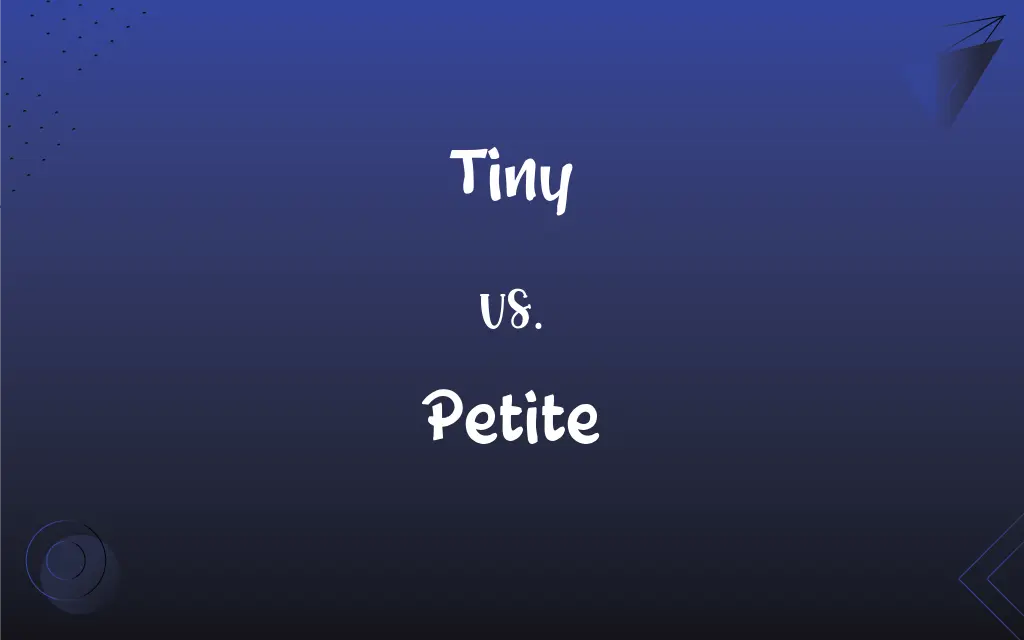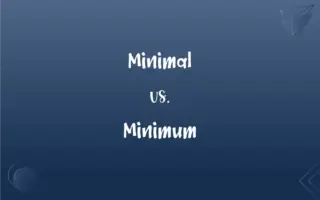Tiny vs. Petite: What's the Difference?
Edited by Harlon Moss || By Janet White || Updated on October 18, 2023
"Tiny refers to something extremely small in size, while petite specifically denotes a small and slender build, often used for people."

Key Differences
"Tiny" is a general adjective used to describe the physical size of any object, person, or entity, emphasizing its minute scale. On the other hand, "petite" is commonly used to describe a human's physique, indicating a small, slender, and sometimes delicate build, but not necessarily short stature.
The term "tiny" can be applied across contexts, referring to anything from a microorganism to a tiny house, indicating a size smaller than the usual. "Petite," however, is specifically about body proportions, often used in the fashion industry to denote a specific clothing size category or a person's small stature and dainty build.
"Tiny" carries no connotations about proportions or the elegance of the item or creature in question; it solely comments on size. Whereas "petite" often carries connotations of delicacy and, in the context of fashion, a certain standard of proportions and even attractiveness.
In terms of usage, "tiny" is a more informal term that can be used in everyday language to describe anything markedly small in size. "Petite" is slightly more formal and has French origins, used more specifically and often in the context of describing women.
Linguistically, "tiny" is a simple descriptive term without much cultural baggage. In contrast, "petite" is a term that has been carried over from French and has nuances, especially in the fashion and beauty industries, where it can denote a particular standard or ideal of body size.
ADVERTISEMENT
Comparison Chart
General Usage
Describes small size
Refers to slender build
Context
Applicable widely
Used for human physique
Connotations
Simply about size
Implies delicacy, proportion
Formality
More informal
Slightly more formal
Cultural Nuance
Little to none
Carries more, especially in fashion
ADVERTISEMENT
Tiny and Petite Definitions
Tiny
Extremely small in size.
The tiny kitten fit perfectly in the palm of my hand.
Petite
Of clothing, designed for or sized for people of shorter stature.
She shopped in the petite section of the store.
Tiny
Of a size much less than average or usual.
They lived in a tiny apartment in the city.
Petite
Describing a woman who is small in height and weight.
The actress was petite but had a commanding presence.
Tiny
Limited or below average in number or quantity.
Only a tiny fraction of the funds has been used so far.
Petite
Delicate and charmingly small.
She wore a petite necklace with a tiny diamond pendant.
Tiny
Used to emphasize how small something is.
There's a tiny chance it might rain today.
Petite
Having a small and slender build.
The petite dancer moved gracefully across the stage.
Tiny
Extremely small
The glass shattered into tiny shards that were hard to clean up.
Petite
Short and slender
This rack of clothing is for petite women.
Tiny
Very small.
Petite
Small in size or scope; tiny
“a bagel that is fairly petite by today's standards” (Ed Levine).
Tiny
A small child; an infant.
Petite
A clothing size for short, slender women.
Tiny
Anything very small.
Petite
(especially of a woman) fairly short and of slim build.
Tiny
Very small; little; puny.
When that I was and a little tiny boy.
Petite
(clothing) of small size.
Tiny
Very small;
Diminutive in stature
A lilliputian chest of drawers
Her petite figure
Tiny feet
The flyspeck nation of Bahrain moved toward democracy
Petite
Small, little; insignificant; petty.
Tiny
Significantly unimportant or of little value.
She had only a tiny bit of bread left to eat.
Petite
Small, little; of a woman or girl, of small size and trim figure.
Petite
A garment size for short or slender women
Petite
Very small;
Diminutive in stature
A lilliputian chest of drawers
Her petite figure
Tiny feet
The flyspeck nation of Bahrain moved toward democracy
Petite
Minor or insignificant (less common usage).
It's a petite issue, hardly worth our concern.
FAQs
Is "petite" only used for women?
Predominantly, but it can describe anything small and proportionally delicate.
Can "tiny" describe a living creature?
Yes, "tiny" can be used for any small-sized entity.
Can "tiny" denote insignificance?
Contextually, yes. It can imply something is negligible.
Can "tiny" refer to an amount or quantity?
Yes, "tiny" can indicate a very small amount or number.
Does "petite" imply shortness?
Often, but it more specifically suggests a slender, delicate build.
Is "tiny" negative or positive?
Neutral. It's a factual description of size.
Does "tiny" comment on proportion?
No, "tiny" strictly speaks about small size, not proportion.
Is "petite" used in men's fashion?
Rarely. It's predominantly used for women's clothing sizes.
Does "tiny" relate to age?
No, it's purely descriptive of size, irrespective of age.
Is "petite" a formal term?
It's not overly formal but is specific and has French origins.
Can "petite" describe objects?
Yes, if they're notably small and delicate, like jewelry.
What's the opposite of "tiny"?
Large, huge, or gigantic, depending on context.
Does "petite" relate to youth?
Not directly. It describes build, not age.
Can "petite" refer to men?
It can, but it's much less common than its use for women.
Can "tiny" be used metaphorically?
Yes, like in "a tiny voice," it's metaphorical for quiet or weak.
Is "petite" a clothing size?
Yes, it denotes a sizing category for shorter, slender individuals.
About Author
Written by
Janet WhiteJanet White has been an esteemed writer and blogger for Difference Wiki. Holding a Master's degree in Science and Medical Journalism from the prestigious Boston University, she has consistently demonstrated her expertise and passion for her field. When she's not immersed in her work, Janet relishes her time exercising, delving into a good book, and cherishing moments with friends and family.
Edited by
Harlon MossHarlon is a seasoned quality moderator and accomplished content writer for Difference Wiki. An alumnus of the prestigious University of California, he earned his degree in Computer Science. Leveraging his academic background, Harlon brings a meticulous and informed perspective to his work, ensuring content accuracy and excellence.































































